
tools
Assorted useful tools, almost entirely generated using LLMs
Stars: 1413
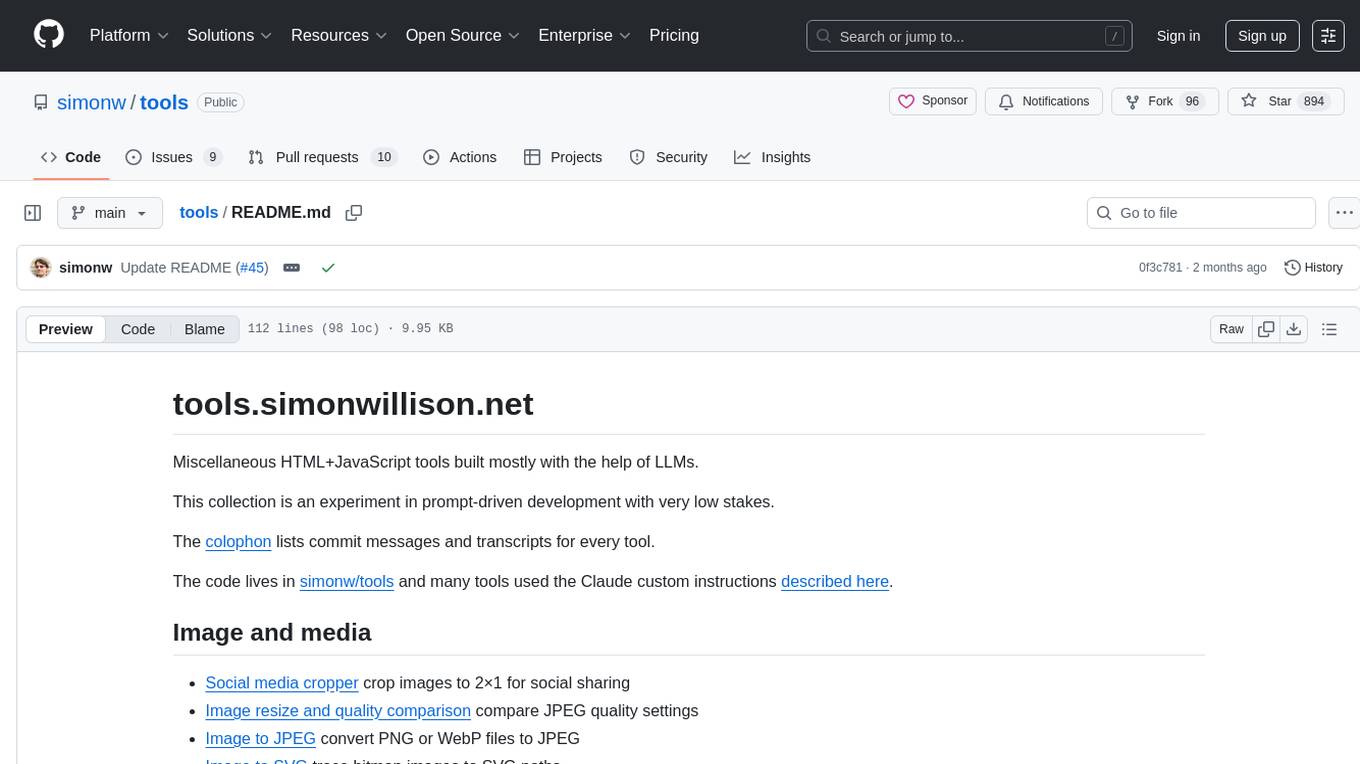
This repository contains a collection of various tools and utilities that can be used for different purposes. It includes scripts, programs, and resources to assist with tasks related to software development, data analysis, automation, and more. The tools are designed to be versatile and easy to use, providing solutions for common challenges faced by developers and users alike.
README:
Miscellaneous HTML+JavaScript tools built mostly with the help of LLMs. See also /python/ for tools written using Python.
This collection is an experiment in prompt-driven development with very low stakes.
The colophon lists commit messages and transcripts for every tool.
The code lives in simonw/tools and many tools used the Claude custom instructions described here.
- Social media cropper crop images to 2×1 for social sharing
- Image resize and quality comparison compare JPEG quality settings
- Image to JPEG convert PNG or WebP files to JPEG
- Image to SVG trace bitmap images to SVG paths
- SVG to JPEG/PNG render an SVG to a raster image
- SVG sandbox display decoded SVG files safely
- SVG progressive render watch an SVG draw itself
- BBox cropper draw bounding boxes and read the coordinates
- Mask visualizer inspect JSON masks with bounding boxes
- FFmpeg crop helper generate FFmpeg commands for cropped videos
- TIFF orientation viewer inspect EXIF orientation metadata
- Avatar web component upload and crop avatars in place
- YouTube Thumbnails list thumbnail URLs for a video
- OCR recognize text from images and PDFs in your browser
- PDF OCR run optical character recognition on uploaded PDFs
- Compare PDFs visualize differences between two PDFs
- Render Markdown convert Markdown to HTML using the GitHub API
- HTML preview type HTML on the left and see it rendered on the right
- RTF to HTML inspect RTF clipboard data and convert it to HTML
- Markdown math live preview of Markdown with LaTeX equations
- Footnotes experiment demo linking footnotes to popups
- Reading time calculator estimate how long text will take to read
- Word counter count words across multiple text blocks
-
Text wrap balance nav explore the
text-wrap: balanceproperty - Navigation for headings generate an ID-based table of contents
- Paste rich text inspect HTML and plain text on your clipboard
- Paste HTML subset see which tags survive HTML sanitization
- Clipboard viewer debug everything stored in your clipboard
- Extract URLs pull a list of links from pasted HTML
- JSON to Markdown transcript convert transcript JSON to Markdown
- JSON to YAML convert between JSON and YAML formats
- YAML Explorer browse YAML documents in a collapsible tree
- JSON schema builder visually design a JSON schema
- Incomplete JSON printer pretty print partial JSON documents
- PHP Deserializer turn serialized PHP into JSON
- SQL Pretty Printer reformat SQL queries for readability
-
Pipfile.lock parser extract dependency versions from
Pipfile.lock
- Timestamp Converter convert Unix timestamps to readable dates
- Timezones compare times across multiple time zones
- Date calculator count days between dates or only weekdays
- Transfer time estimator work out how long file transfers will take
- Token usage calculator summarize LLM token logs by model
- LLM prices redirect quick link to the latest model pricing site
- CSV marker map plot markers on a map from a CSV file
- Species observation map browse recent iNaturalist sightings
- GitHub API write upload text or images directly to a repo
- GitHub issue viewer fetch GitHub issues and comments
- GitHub issue to Markdown turn an issue thread into Markdown
- Zip/Wheel explorer view the contents of Python wheels and zips
- Ares phonetic alphabet convert text to the ARES emergency phonetic code
- Code with Claude 2025 prototype workflow for Claude coding
-
Side panel dialog demo experiment with the HTML
dialogelement - Broadcast channel chat chat across tabs using BroadcastChannel
- Bluesky WebSocket Firehose watch real-time activity on Bluesky
-
Bluesky resolve DID convert a handle like
simonwillison.netinto a DID - Bluesky timeline view a user’s recent posts and replies
- Bluesky thread export save a Bluesky thread to Markdown
- Bluesky quote finder find all quotes of a Bluesky post
- Event planner rough schedule planner stored in localStorage
- Passkeys demo experiment with browser-based passkey authentication
- Haiku generate haikus using Claude Haiku and your webcam
- Chrome Prompt Playground run prompts on Chrome’s Gemini Nano
- Gemini bounding box visualizer visualize bounding boxes returned by Gemini
- Gemini chat client simple chat UI for the Gemini API
- Gemini mask visualizer overlay segmentation masks from Gemini
- Gemini image JSON renderer display images from Gemini JSON output
- Claude Token Counter count tokens for Claude prompts
- OpenAI audio input record and send audio to OpenAI models
- OpenAI audio output generate speech with OpenAI voices
- OpenAI WebRTC demo interact with OpenAI’s real-time audio API
- GPT-4o Gist audio player play audio responses stored on GitHub Gist
- JSON schema builder build JSON schemas with a visual editor
- Arena animated animated chart of the LMSYS Chatbot Arena
- California Clock Change see when daylight saving time changes
- Open Sauce 2025 schedule browse the upcoming conference sessions
- OpenFreeMap demo MapLibre demo with random points in San Francisco
- Progress of the US presidency track days elapsed in the current term
- User Agent display show your browser’s user agent string
- Encrypt / decrypt message share short encrypted messages
- ARIA live regions demo of dynamic page announcements
- Prompts.js small library for nicer JavaScript prompts
- APSW SQLite query explainer explain SQLite queries using APSW
On Observable:
- Blog to newsletter helps turn blog posts into a newsletter
- Convert Claude JSON to Markdown for sharing Claude transcripts
- Hacker News homepage with links to comments ordered by most recent first
For Tasks:
Click tags to check more tools for each tasksFor Jobs:
Alternative AI tools for tools
Similar Open Source Tools

tools
This repository contains a collection of various tools and utilities that can be used for different purposes. It includes scripts, programs, and resources to assist with tasks related to software development, data analysis, automation, and more. The tools are designed to be versatile and easy to use, providing solutions for common challenges faced by developers and users alike.
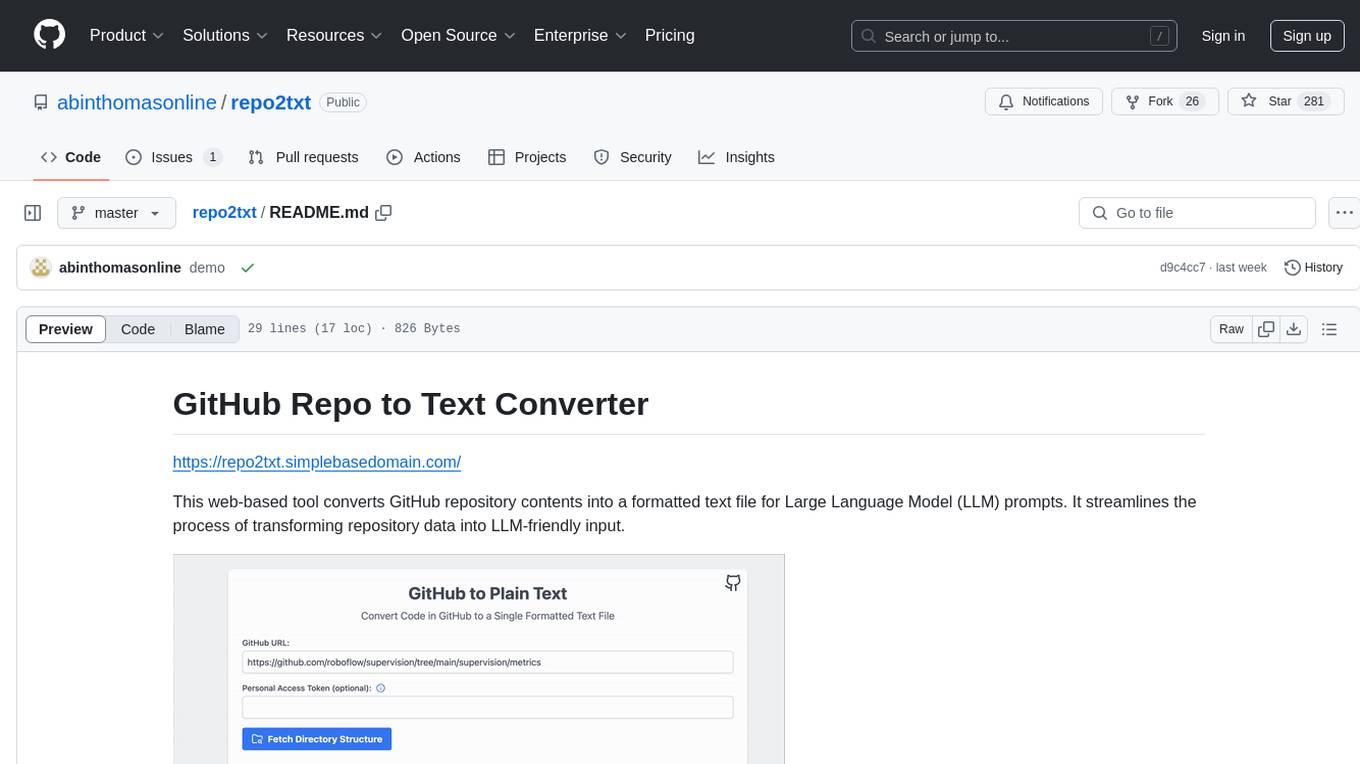
repo2txt
The GitHub Repo to Text Converter is a web-based tool that converts GitHub repository contents into a formatted text file for Large Language Model (LLM) prompts. It streamlines the process of transforming repository data into LLM-friendly input. The tool displays the GitHub repository structure, allows users to select files/directories to include, generates a formatted text file, enables copying text to clipboard, supports downloading generated text, and works with private repositories. It ensures data security by running entirely in the browser without server-side processing.
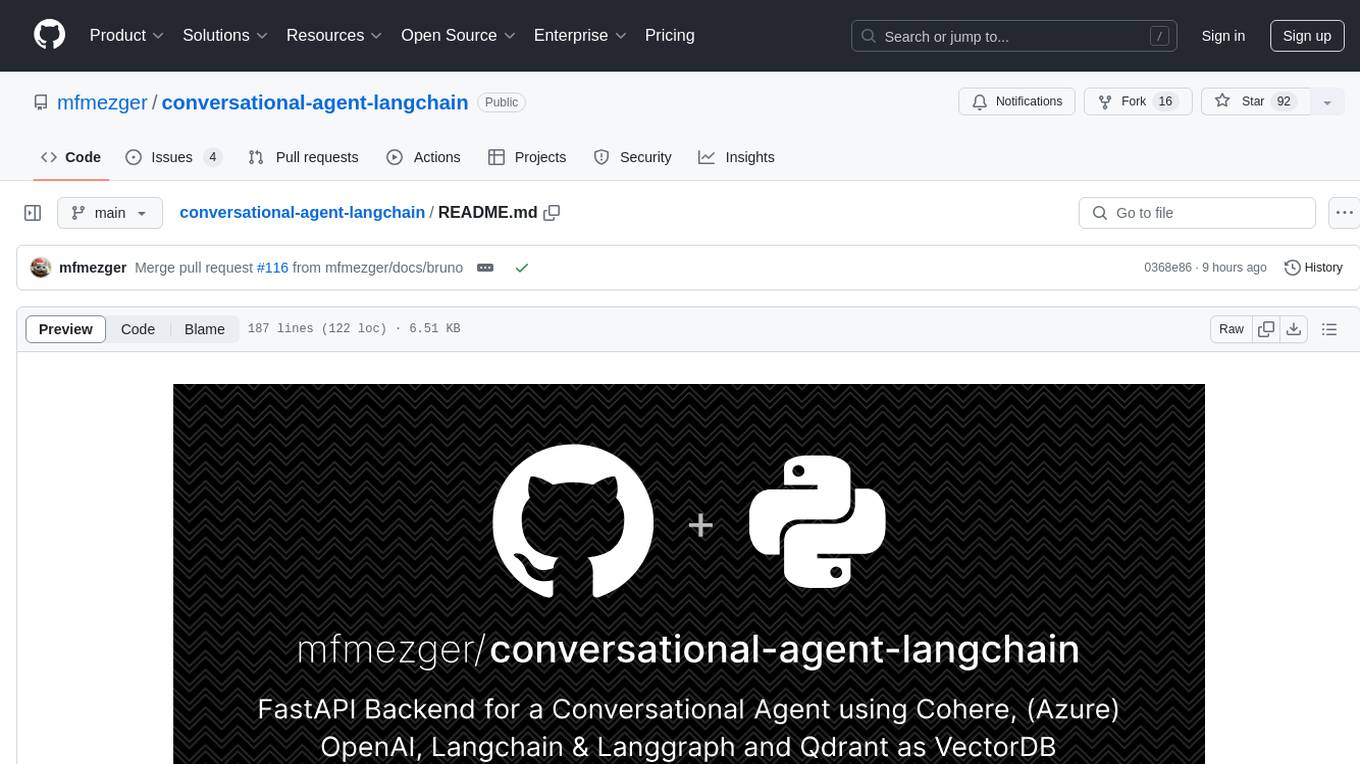
conversational-agent-langchain
This repository contains a Rest-Backend for a Conversational Agent that allows embedding documents, semantic search, QA based on documents, and document processing with Large Language Models. It uses Aleph Alpha and OpenAI Large Language Models to generate responses to user queries, includes a vector database, and provides a REST API built with FastAPI. The project also features semantic search, secret management for API keys, installation instructions, and development guidelines for both backend and frontend components.
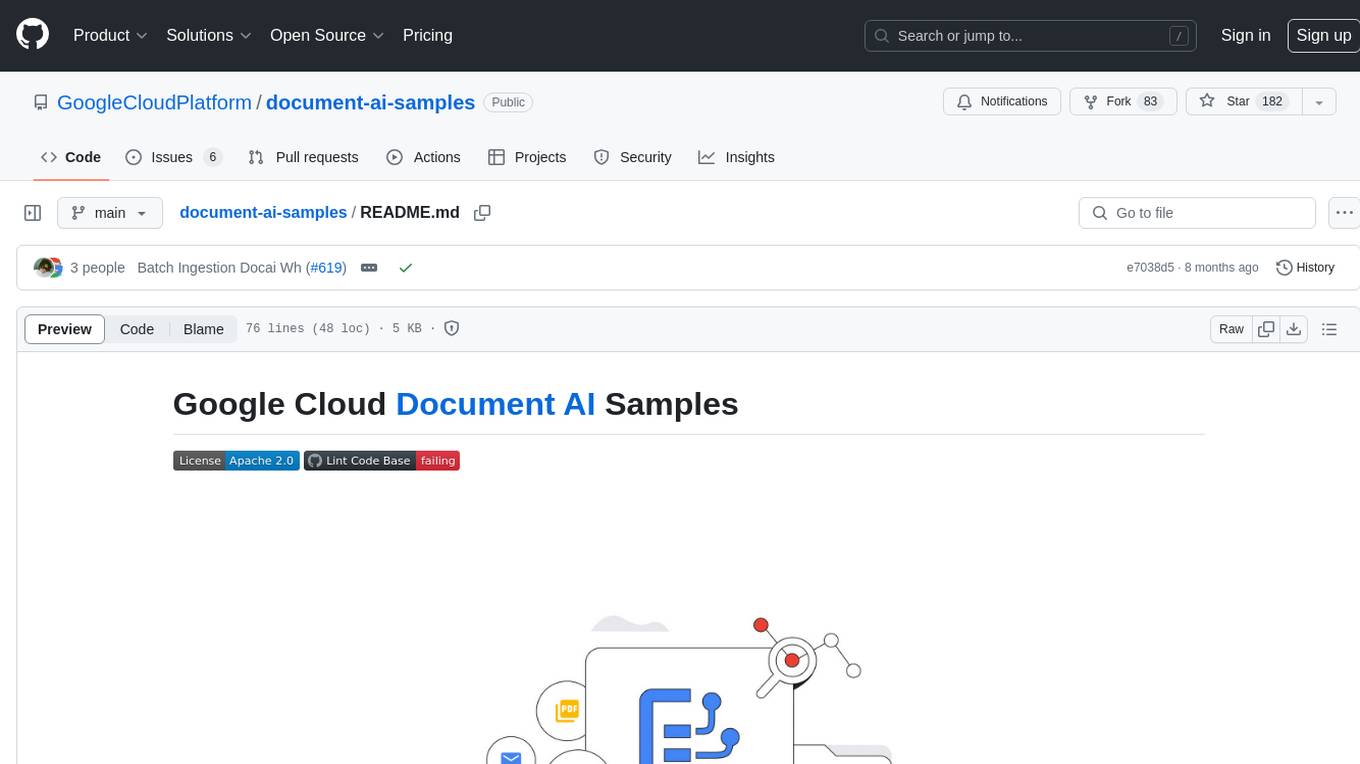
document-ai-samples
The Google Cloud Document AI Samples repository contains code samples and Community Samples demonstrating how to analyze, classify, and search documents using Google Cloud Document AI. It includes various projects showcasing different functionalities such as integrating with Google Drive, processing documents using Python, content moderation with Dialogflow CX, fraud detection, language extraction, paper summarization, tax processing pipeline, and more. The repository also provides access to test document files stored in a publicly-accessible Google Cloud Storage Bucket. Additionally, there are codelabs available for optical character recognition (OCR), form parsing, specialized processors, and managing Document AI processors. Community samples, like the PDF Annotator Sample, are also included. Contributions are welcome, and users can seek help or report issues through the repository's issues page. Please note that this repository is not an officially supported Google product and is intended for demonstrative purposes only.
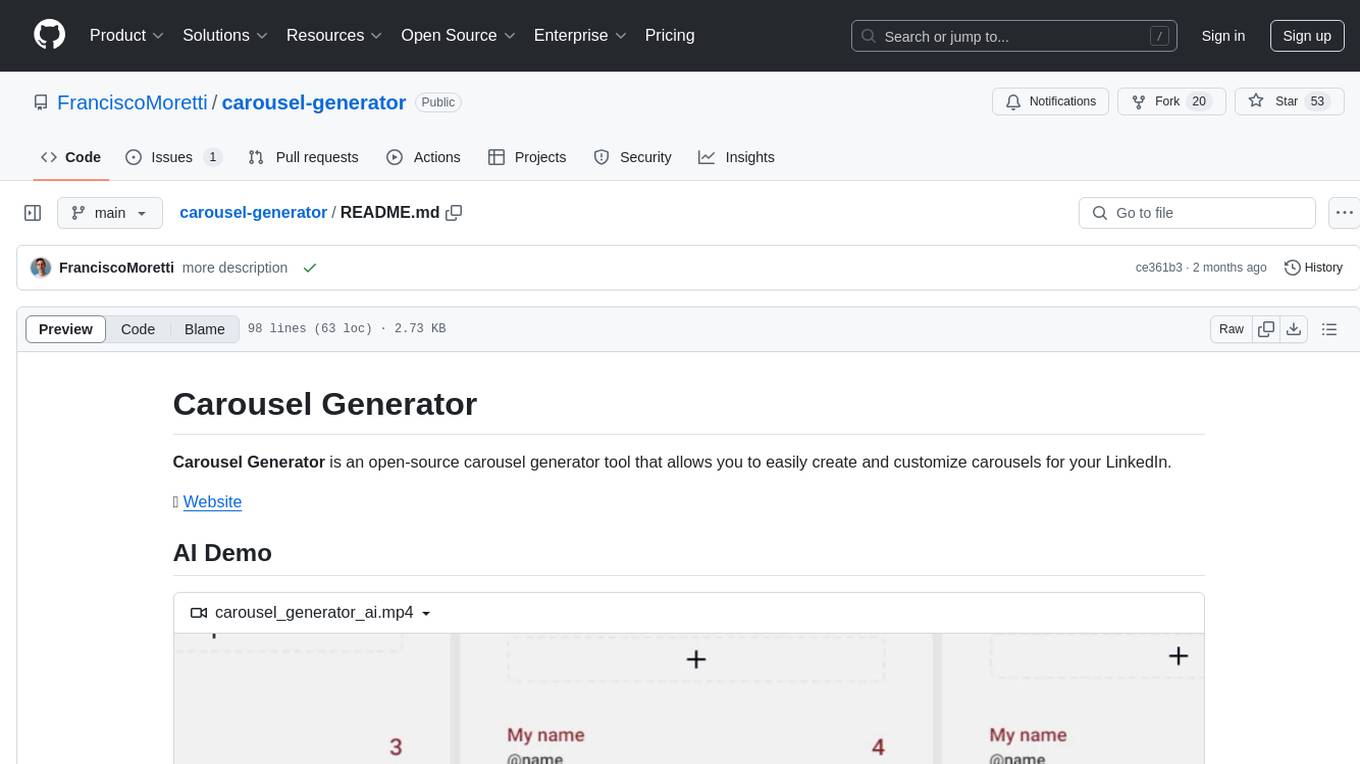
carousel-generator
Carousel Generator is an open-source tool for creating and customizing carousels for LinkedIn. It comes with AI carousel generation, react-hook-form powered forms, sleek UI components, input validation, responsive layout, automatic updates, icons, titles auto-balance, data persistence, various settings configuration, slide management, different slide types, export/import features, emoji support, and font selection.
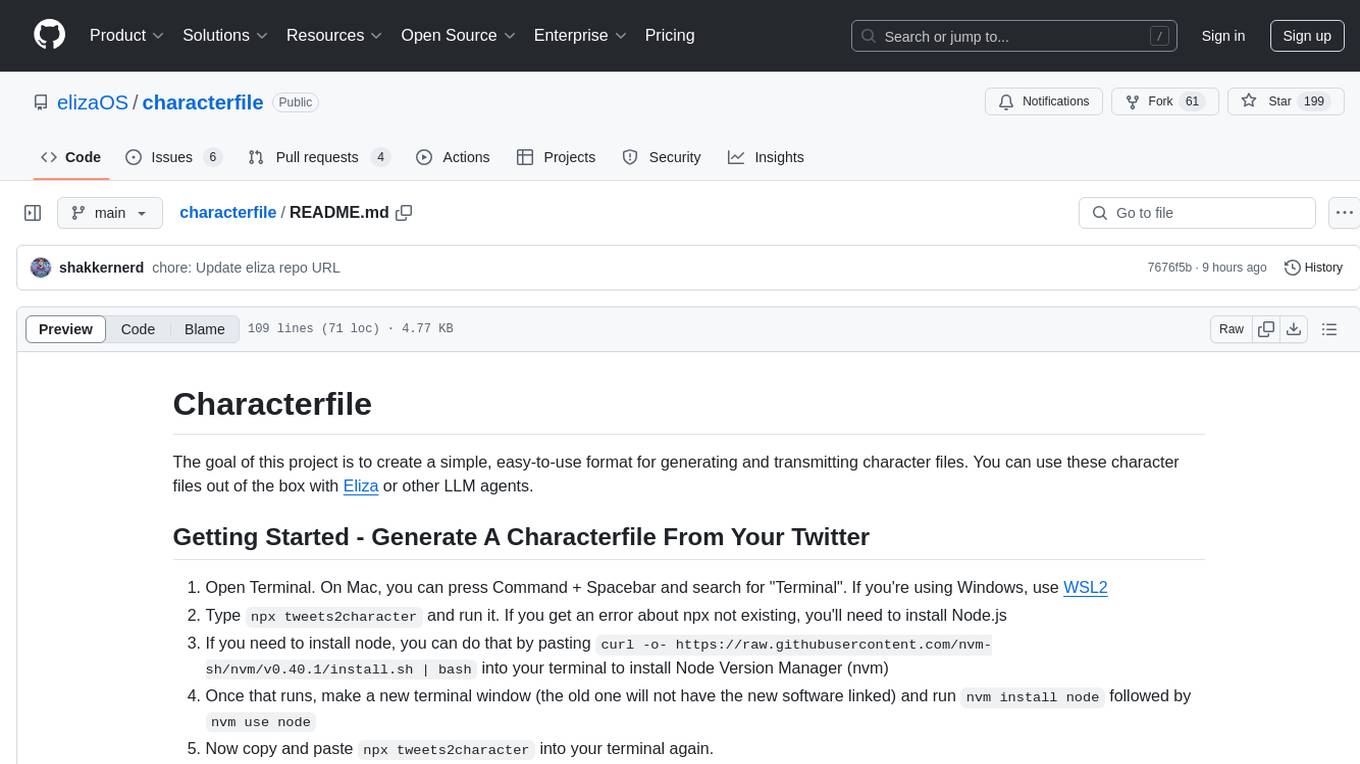
characterfile
The Characterfile project aims to create a simple format for generating and transmitting character files, compatible with Eliza and other LLM agents. Users can convert their Twitter archive into a character file using the provided scripts. The project also includes examples, JSON schema, and TypeScript types for the character file. Scripts like tweets2character, folder2knowledge, and knowledge2character facilitate the conversion of tweets, documents, and knowledge files into character files for use with AI agents.
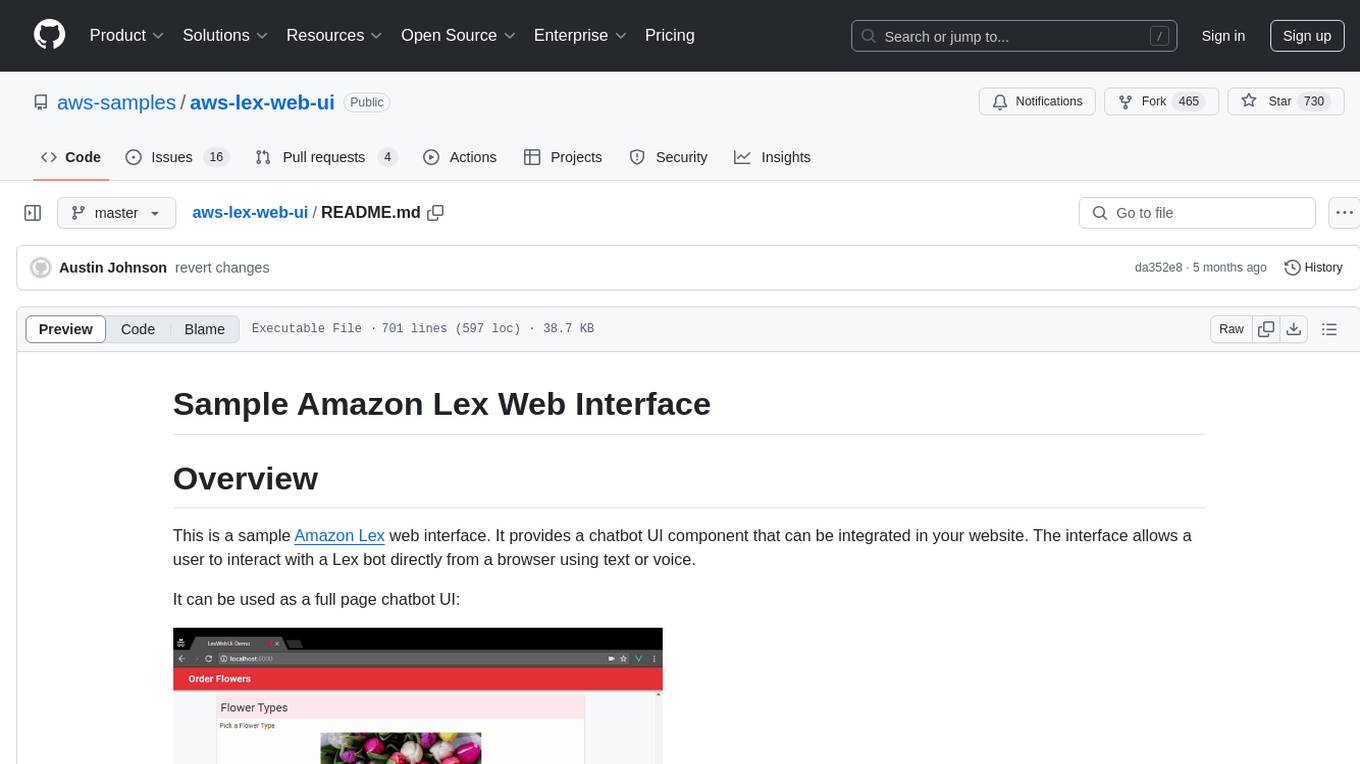
aws-lex-web-ui
The AWS Lex Web UI is a sample Amazon Lex web interface that provides a chatbot UI component for integration into websites. It supports voice and text interactions, Lex response cards, and programmable configuration using JavaScript. The interface can be used as a full-page chatbot UI or embedded as a widget. It offers mobile-ready responsive UI, seamless voice-text switching, and interactive messaging support. The project includes CloudFormation templates for easy deployment and customization. Users can modify configurations, integrate the UI into existing sites, and deploy using various methods like CloudFormation, pre-built libraries, or npm installation.
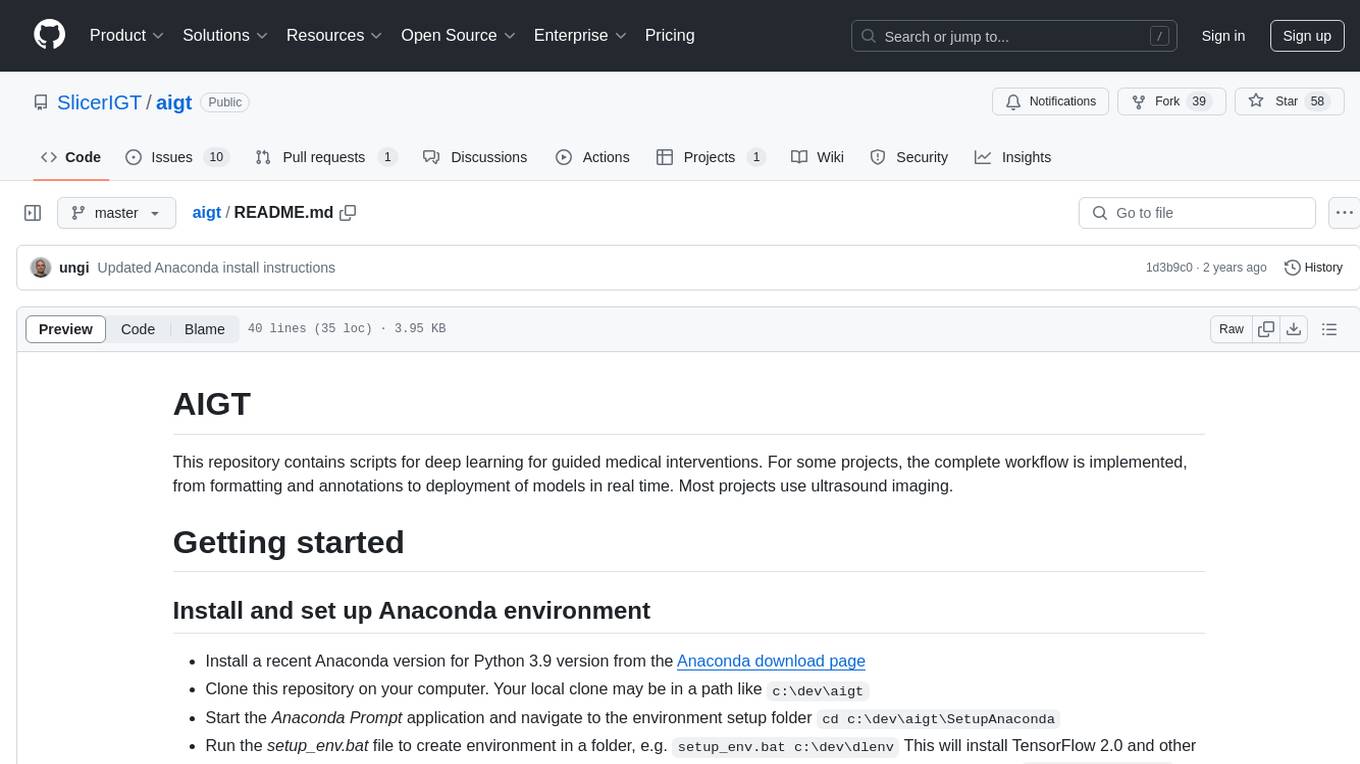
aigt
AIGT is a repository containing scripts for deep learning in guided medical interventions, focusing on ultrasound imaging. It provides a complete workflow from formatting and annotations to real-time model deployment. Users can set up an Anaconda environment, run Slicer notebooks, acquire tracked ultrasound data, and process exported data for training. The repository includes tools for segmentation, image export, and annotation creation.
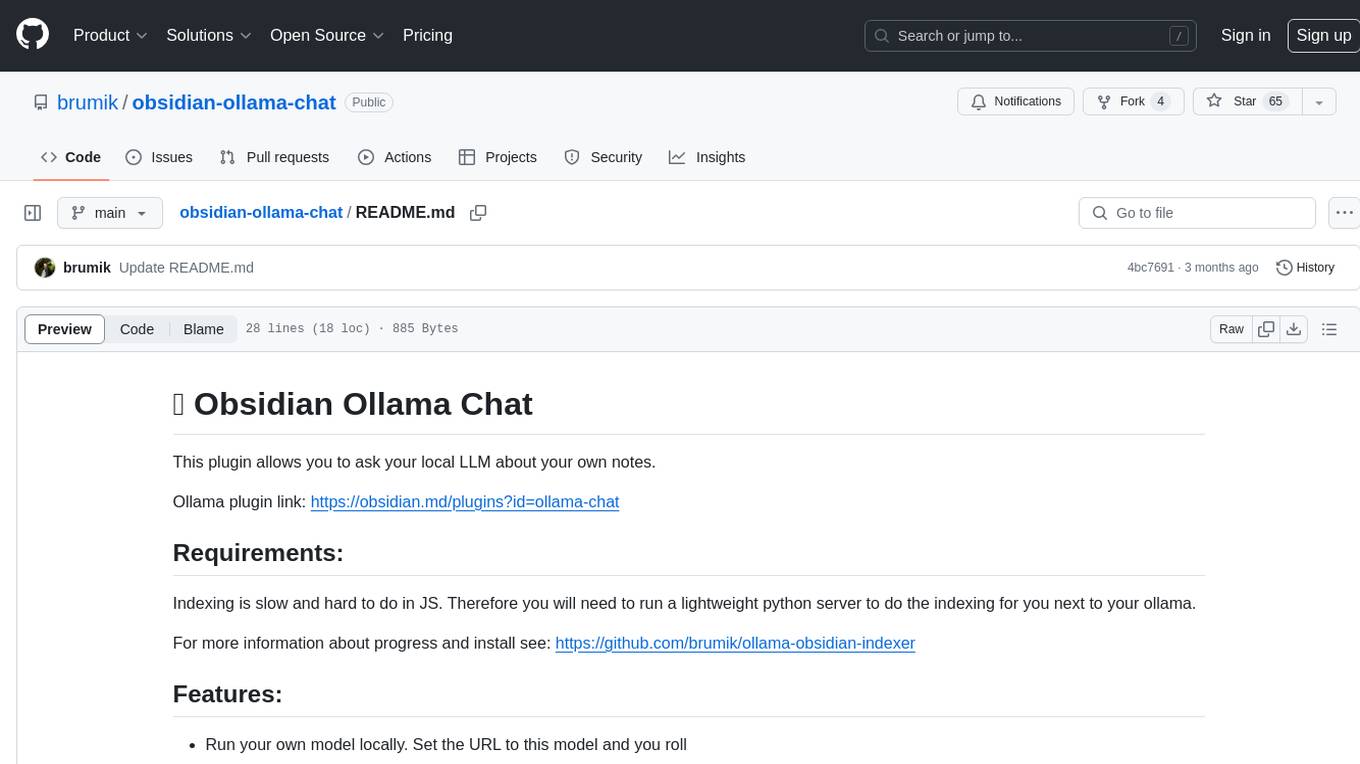
obsidian-ollama-chat
Obsidian Ollama Chat is a plugin that enables users to interact with their local LLM (Large Language Model) to ask questions about their own notes. The plugin facilitates running a lightweight python server for indexing notes, allowing users to set a model URL, index files on startup and modification, and open a modal to ask questions. Future plans include text streaming for querying, a chat window for communication, and commands for quick queries like summarizing notes or topics.
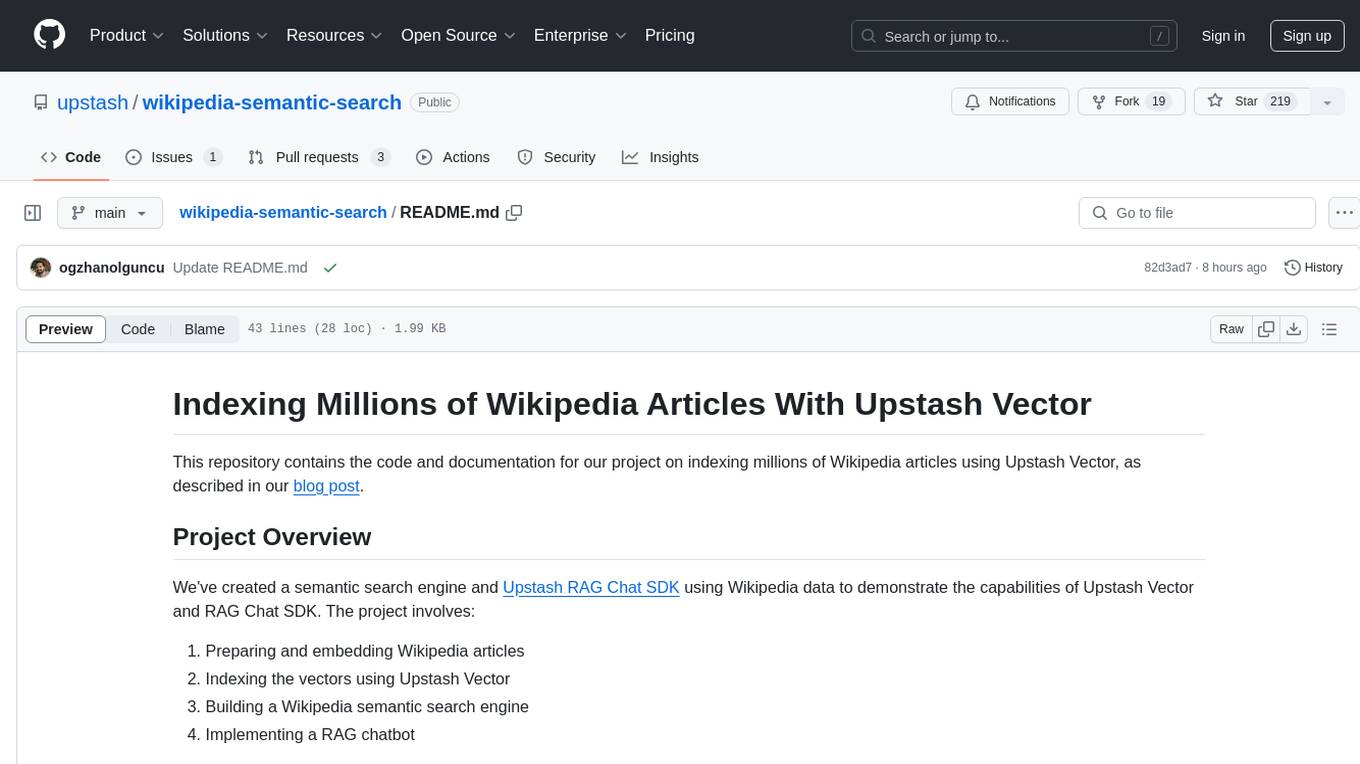
wikipedia-semantic-search
This repository showcases a project that indexes millions of Wikipedia articles using Upstash Vector. It includes a semantic search engine and a RAG chatbot SDK. The project involves preparing and embedding Wikipedia articles, indexing vectors, building a semantic search engine, and implementing a RAG chatbot. Key features include indexing over 144 million vectors, multilingual support, cross-lingual semantic search, and a RAG chatbot. Technologies used include Upstash Vector, Upstash Redis, Upstash RAG Chat SDK, SentenceTransformers, and Meta-Llama-3-8B-Instruct for LLM provider.
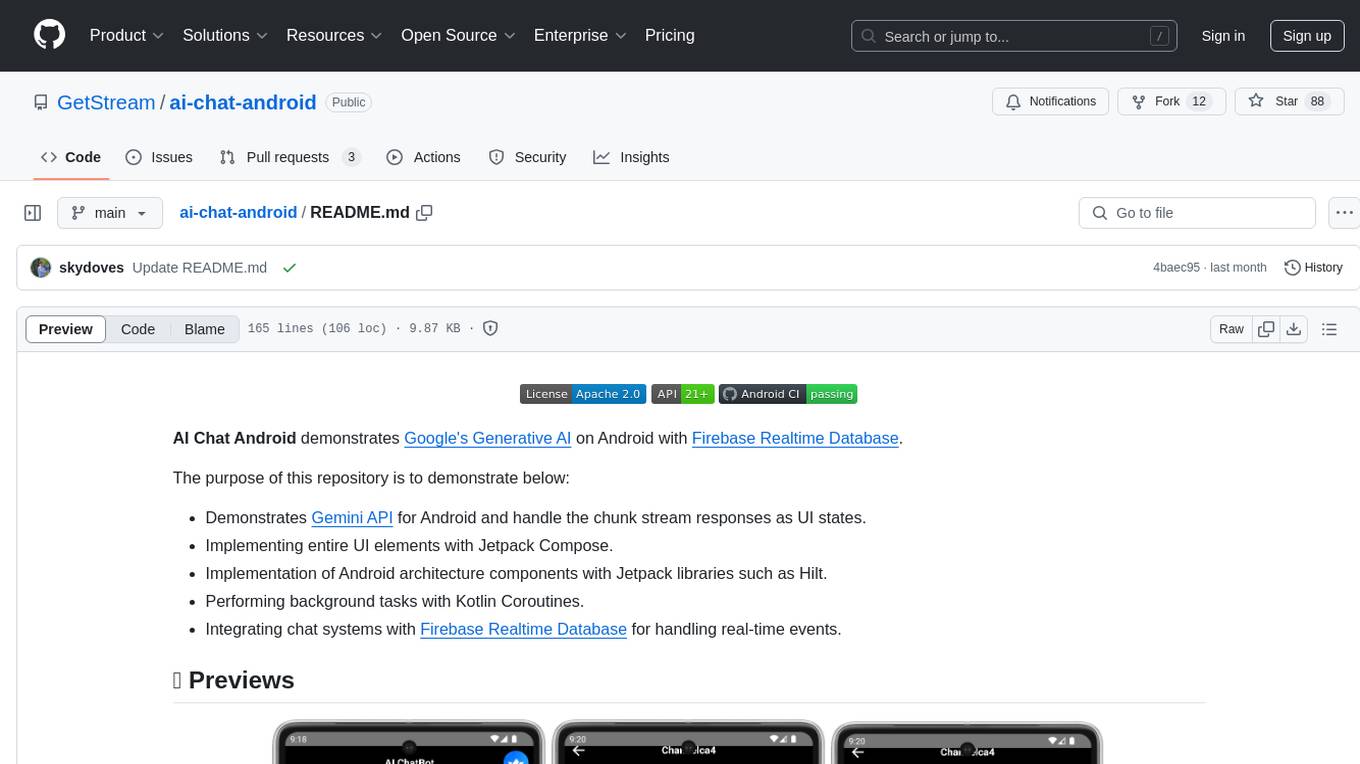
ai-chat-android
AI Chat Android demonstrates Google's Generative AI on Android with Firebase Realtime Database. It showcases Gemini API integration, Jetpack Compose UI elements, Android architecture components with Hilt, Kotlin Coroutines for background tasks, and Firebase Realtime Database integration for real-time events. The project follows Google's official architecture guidance with a modularized structure for reusability, parallel building, and decentralized focusing.
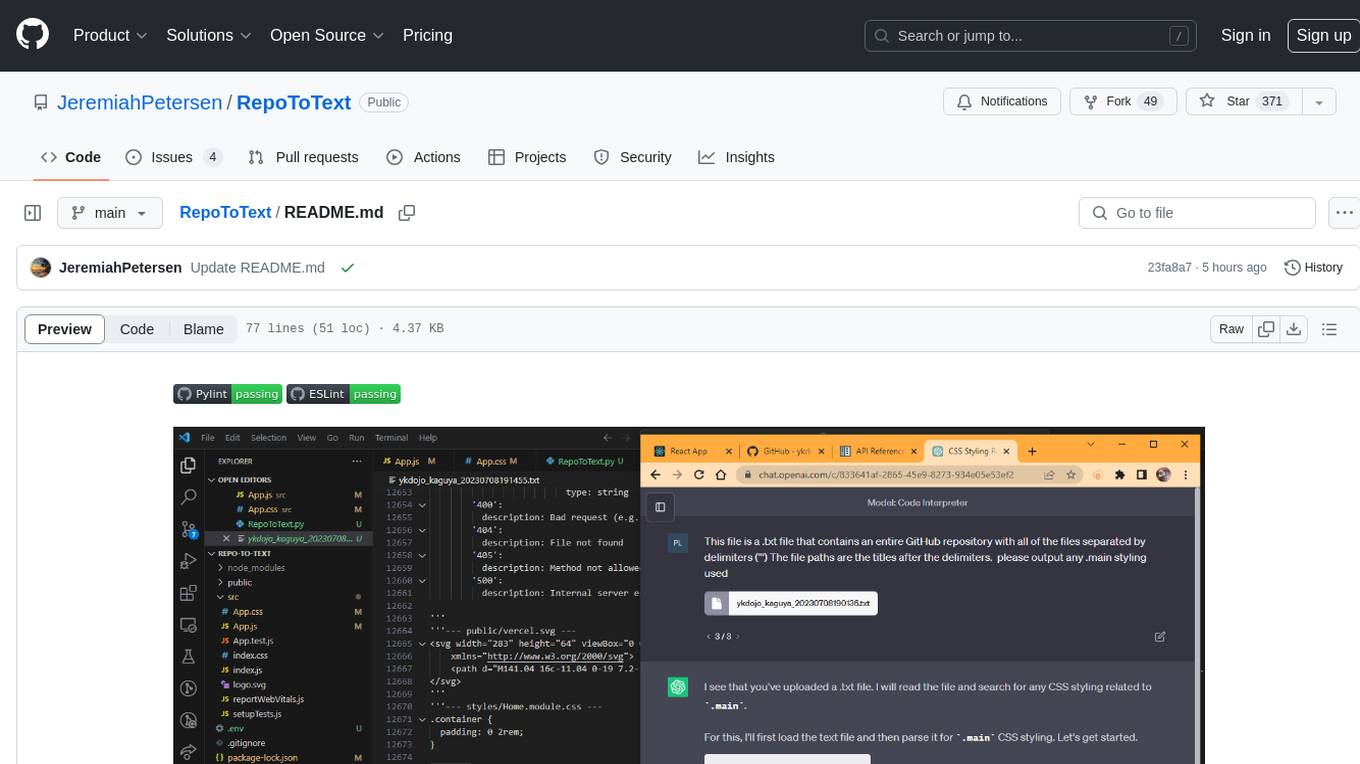
RepoToText
RepoToText is a web app that scrapes a GitHub repository and converts its files into a single organized .txt. It allows users to enter the URL of a GitHub repository and an optional documentation URL, retrieves the contents of the repository and documentation, and saves them in a structured text file. The tool can be used to interact with the repository using chatbots like GPT-4 or Claude Opus. Users can run the application with Docker, set up environment variables, choose specific file types for scraping, and copy the generated text to the clipboard. Additionally, FolderToText.py script allows converting local folders or files into a .txt file with customizable options.
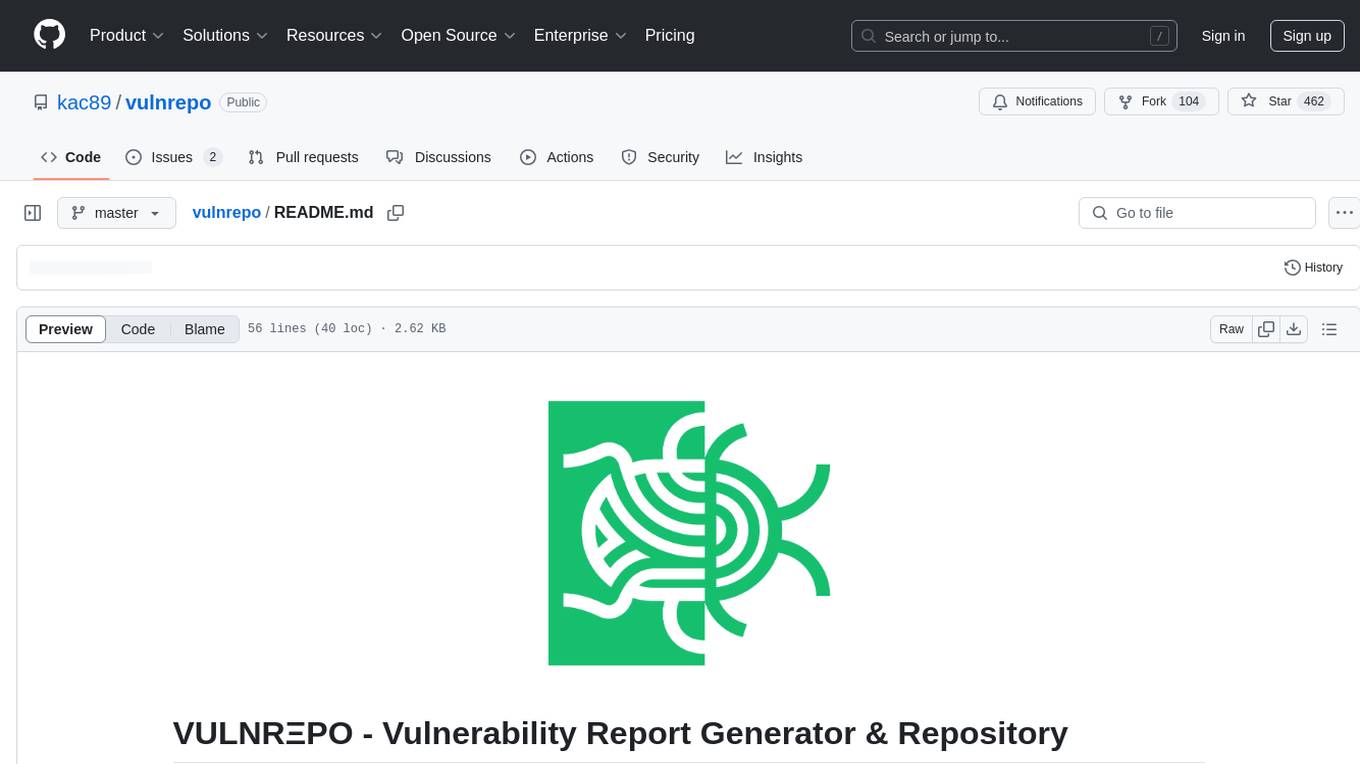
vulnrepo
VULNRΞPO is a vulnerability report generator and repository tool that prioritizes security by using browser-based encryption and storing data locally. It offers features such as custom templates for pentesters, importing issues from various security scanners, multiple report formats (TXT, HTML, DOCX, PDF), attachment support with checksum verification, changelog tracking, issue export to bugtrackers, AES encryption for report sharing, API integration for backend storage, report template customization, audit tool for research completeness, and local LLM model usage. The tool is designed for efficient vulnerability management and secure report generation.
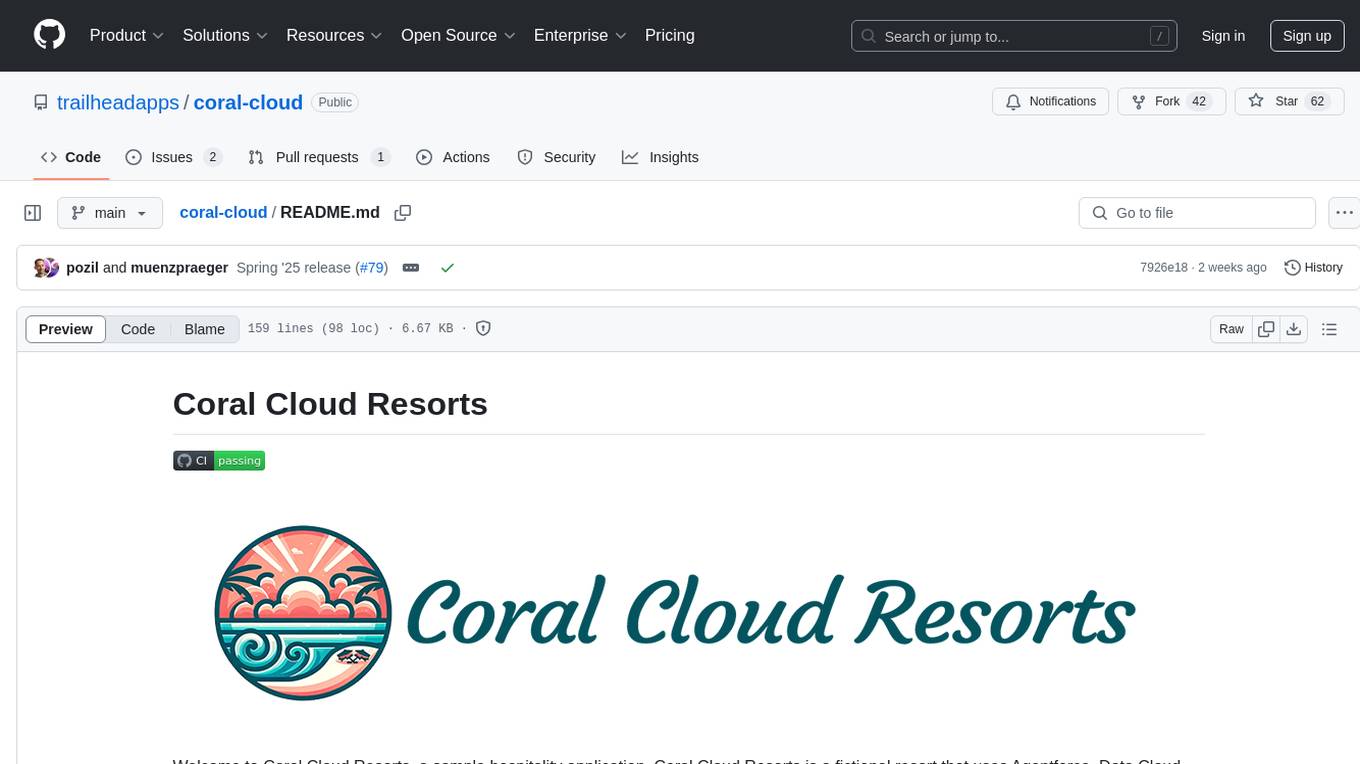
coral-cloud
Coral Cloud Resorts is a sample hospitality application that showcases Data Cloud, Agents, and Prompts. It provides highly personalized guest experiences through smart automation, content generation, and summarization. The app requires licenses for Data Cloud, Agents, Prompt Builder, and Einstein for Sales. Users can activate features, deploy metadata, assign permission sets, import sample data, and troubleshoot common issues. Additionally, the repository offers integration with modern web development tools like Prettier, ESLint, and pre-commit hooks for code formatting and linting.
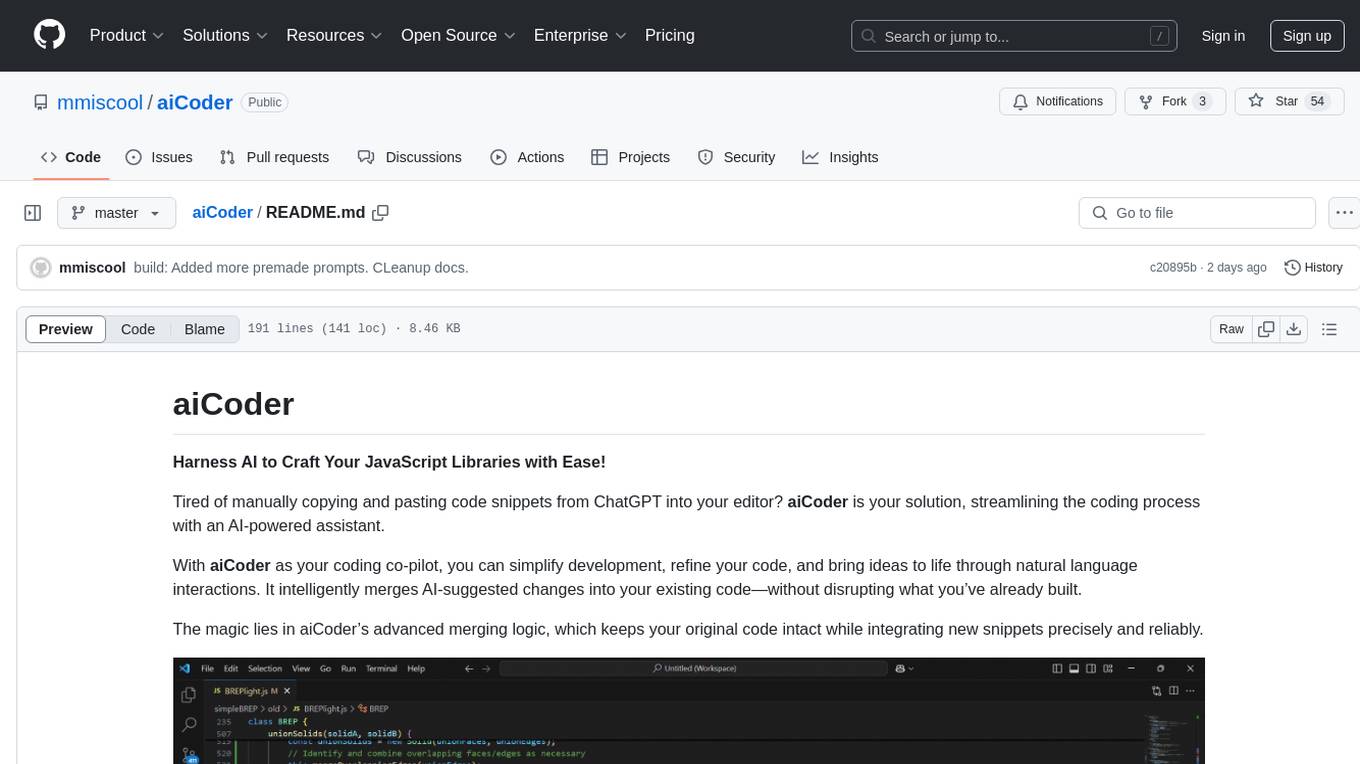
aiCoder
aiCoder is an AI-powered tool designed to streamline the coding process by automating repetitive tasks, providing intelligent code suggestions, and facilitating the integration of new features into existing codebases. It offers a chat interface for natural language interactions, methods and stubs lists for code modification, and settings customization for project-specific prompts. Users can leverage aiCoder to enhance code quality, focus on higher-level design, and save time during development.
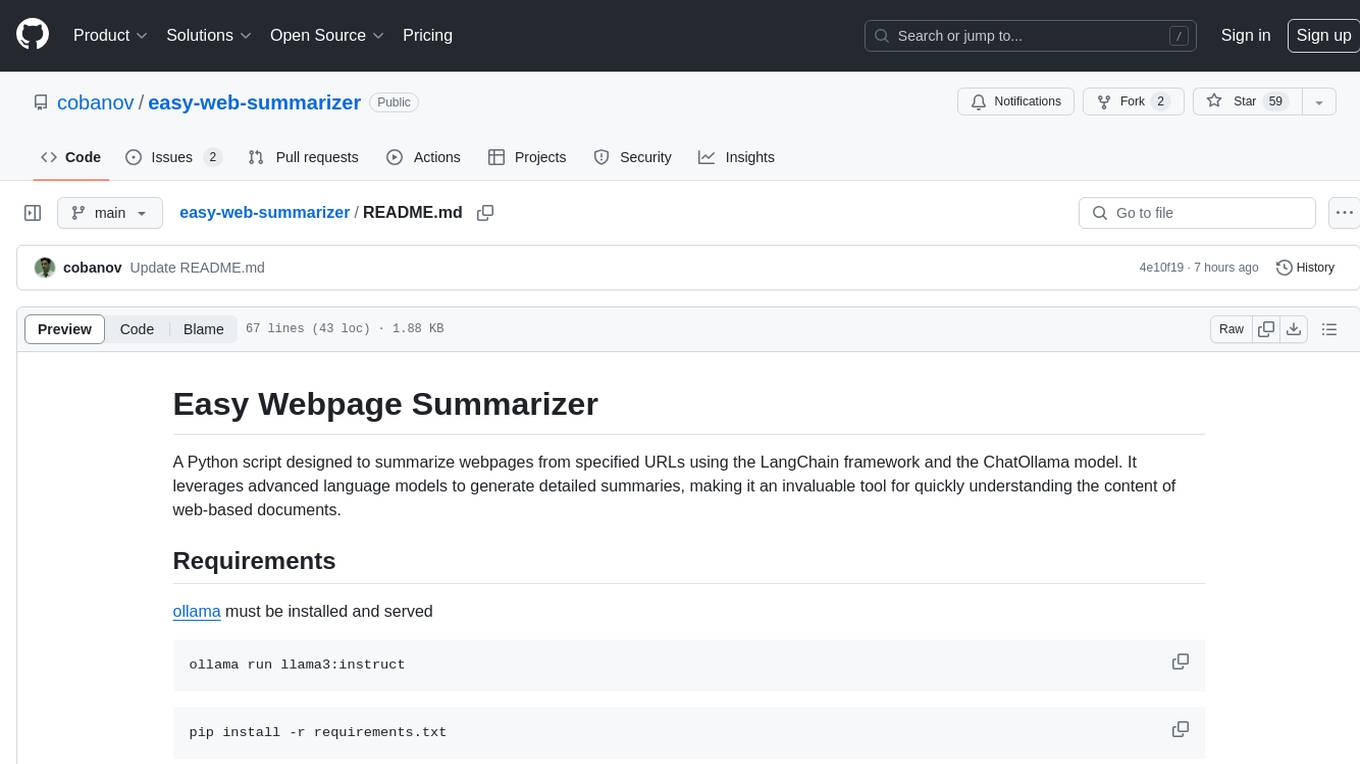
easy-web-summarizer
A Python script leveraging advanced language models to summarize webpages and youtube videos directly from URLs. It integrates with LangChain and ChatOllama for state-of-the-art summarization, providing detailed summaries for quick understanding of web-based documents. The tool offers a command-line interface for easy use and integration into workflows, with plans to add support for translating to different languages and streaming text output on gradio. It can also be used via a web UI using the gradio app. The script is dockerized for easy deployment and is open for contributions to enhance functionality and capabilities.
For similar tasks

Azure-Analytics-and-AI-Engagement
The Azure-Analytics-and-AI-Engagement repository provides packaged Industry Scenario DREAM Demos with ARM templates (Containing a demo web application, Power BI reports, Synapse resources, AML Notebooks etc.) that can be deployed in a customer’s subscription using the CAPE tool within a matter of few hours. Partners can also deploy DREAM Demos in their own subscriptions using DPoC.

sorrentum
Sorrentum is an open-source project that aims to combine open-source development, startups, and brilliant students to build machine learning, AI, and Web3 / DeFi protocols geared towards finance and economics. The project provides opportunities for internships, research assistantships, and development grants, as well as the chance to work on cutting-edge problems, learn about startups, write academic papers, and get internships and full-time positions at companies working on Sorrentum applications.

tidb
TiDB is an open-source distributed SQL database that supports Hybrid Transactional and Analytical Processing (HTAP) workloads. It is MySQL compatible and features horizontal scalability, strong consistency, and high availability.

zep-python
Zep is an open-source platform for building and deploying large language model (LLM) applications. It provides a suite of tools and services that make it easy to integrate LLMs into your applications, including chat history memory, embedding, vector search, and data enrichment. Zep is designed to be scalable, reliable, and easy to use, making it a great choice for developers who want to build LLM-powered applications quickly and easily.

telemetry-airflow
This repository codifies the Airflow cluster that is deployed at workflow.telemetry.mozilla.org (behind SSO) and commonly referred to as "WTMO" or simply "Airflow". Some links relevant to users and developers of WTMO: * The `dags` directory in this repository contains some custom DAG definitions * Many of the DAGs registered with WTMO don't live in this repository, but are instead generated from ETL task definitions in bigquery-etl * The Data SRE team maintains a WTMO Developer Guide (behind SSO)

mojo
Mojo is a new programming language that bridges the gap between research and production by combining Python syntax and ecosystem with systems programming and metaprogramming features. Mojo is still young, but it is designed to become a superset of Python over time.

pandas-ai
PandasAI is a Python library that makes it easy to ask questions to your data in natural language. It helps you to explore, clean, and analyze your data using generative AI.

databend
Databend is an open-source cloud data warehouse that serves as a cost-effective alternative to Snowflake. With its focus on fast query execution and data ingestion, it's designed for complex analysis of the world's largest datasets.
For similar jobs

lollms-webui
LoLLMs WebUI (Lord of Large Language Multimodal Systems: One tool to rule them all) is a user-friendly interface to access and utilize various LLM (Large Language Models) and other AI models for a wide range of tasks. With over 500 AI expert conditionings across diverse domains and more than 2500 fine tuned models over multiple domains, LoLLMs WebUI provides an immediate resource for any problem, from car repair to coding assistance, legal matters, medical diagnosis, entertainment, and more. The easy-to-use UI with light and dark mode options, integration with GitHub repository, support for different personalities, and features like thumb up/down rating, copy, edit, and remove messages, local database storage, search, export, and delete multiple discussions, make LoLLMs WebUI a powerful and versatile tool.

Azure-Analytics-and-AI-Engagement
The Azure-Analytics-and-AI-Engagement repository provides packaged Industry Scenario DREAM Demos with ARM templates (Containing a demo web application, Power BI reports, Synapse resources, AML Notebooks etc.) that can be deployed in a customer’s subscription using the CAPE tool within a matter of few hours. Partners can also deploy DREAM Demos in their own subscriptions using DPoC.

minio
MinIO is a High Performance Object Storage released under GNU Affero General Public License v3.0. It is API compatible with Amazon S3 cloud storage service. Use MinIO to build high performance infrastructure for machine learning, analytics and application data workloads.

mage-ai
Mage is an open-source data pipeline tool for transforming and integrating data. It offers an easy developer experience, engineering best practices built-in, and data as a first-class citizen. Mage makes it easy to build, preview, and launch data pipelines, and provides observability and scaling capabilities. It supports data integrations, streaming pipelines, and dbt integration.

AiTreasureBox
AiTreasureBox is a versatile AI tool that provides a collection of pre-trained models and algorithms for various machine learning tasks. It simplifies the process of implementing AI solutions by offering ready-to-use components that can be easily integrated into projects. With AiTreasureBox, users can quickly prototype and deploy AI applications without the need for extensive knowledge in machine learning or deep learning. The tool covers a wide range of tasks such as image classification, text generation, sentiment analysis, object detection, and more. It is designed to be user-friendly and accessible to both beginners and experienced developers, making AI development more efficient and accessible to a wider audience.

tidb
TiDB is an open-source distributed SQL database that supports Hybrid Transactional and Analytical Processing (HTAP) workloads. It is MySQL compatible and features horizontal scalability, strong consistency, and high availability.

airbyte
Airbyte is an open-source data integration platform that makes it easy to move data from any source to any destination. With Airbyte, you can build and manage data pipelines without writing any code. Airbyte provides a library of pre-built connectors that make it easy to connect to popular data sources and destinations. You can also create your own connectors using Airbyte's no-code Connector Builder or low-code CDK. Airbyte is used by data engineers and analysts at companies of all sizes to build and manage their data pipelines.

labelbox-python
Labelbox is a data-centric AI platform for enterprises to develop, optimize, and use AI to solve problems and power new products and services. Enterprises use Labelbox to curate data, generate high-quality human feedback data for computer vision and LLMs, evaluate model performance, and automate tasks by combining AI and human-centric workflows. The academic & research community uses Labelbox for cutting-edge AI research.